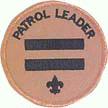|
The Patrol Method
The Patrol Leaders Creed
Junior Assistant Scout Master
Senior Patrol Leader
Assistant Senior Patrol Leader
Patrol Leader
Assistant Patrol Leader
Troop Guide
Instructor
Bugler
Chaplain Aide
Den Chief
Historian
Librarian
OA Representative
Quartermaster
Scribe
|
Patrol Leader

General Information
Description:The Patrol Leader is the elected leader of his patrol. He represents his patrol on the Patrol Leader's Council.
Comments: The Patrol Leader may easily be the most important job in the troop. He has the closest contact with the patrol members and is in the perfect position to help and guide them. The Patrol Leaders, along with the Senior Patrol Leader and Assistant Senior Patrol Leader are the primary members of the Patrol Leaders' Council.
| Reports to: |
|
Senior Patrol Leader |
| Type: |
|
Elected by members of the patrol |
| Term: |
|
6 months |
Qualifications
| Age: |
|
None |
| Rank: |
|
None |
| Experience: |
|
None |
| Attendance: |
|
75% for all activities over previous 6 months |
| Confirmation: |
|
Nomination Approved by Scoutmaster |
Performance Requirements
| Training: |
|
You must attend the troop Junior Leader Training even if you have attended in the past. |
| Attendance: |
|
You are expected to attend 85% of all troop meetings, Patrol Leaders' Council meetings, outings, and service projects. If your attendance is low, or if you have three (3) unexcused absences in a row, you can be removed from office. |
| Effort: |
|
You are expected to give this job your best effort and use the adult leadership and advice when you feel they are needed. |
General Leadership Responsibilities
| Uniform: |
|
Set the example by wearing your uniform correctly. This means that you will wear all of the parts of the troop uniform, shirttail tucked in, with all required badges in their correct locations. |
| Behavior: |
|
Set the example by living the Scout Oath and Law in your everyday life. Show Scout Spirit in everything you say and do. |
| Attendance: |
|
Set the example by being an active Scout. Be on time for meetings and activities. You must call the Senior Patrol Leader or Scoutmaster if you are not going to be at a meeting or if you suddenly have to miss an outing. You also need to make sure that the Assistant Senior Patrol Leader is ready to assume your responsibilities. This requires you to "Be Prepared", plan ahead and this will never be an issue. |
Specific Leadership Responsibilities
- Appoints the Assistant Patrol Leader.
- Represents the patrol on the Patrol Leader's Council.
- Plans and steers patrol meetings.
- Helps Scouts advance.
- Acts as the chief recruiter of new Scouts.
- Keeps patrol members informed.
- Knows what his patrol members and other leaders can do.
- Follows the Patrol Method and understands the 10 things to be a better leader.
- Note: You can still have a conference with your advisor at any time. If you feel like having a discussion, just ask.
| Duties |
What it means in Troop 1 |
| Plan and lead patrol meetings and activities |
- Have at least six patrol activities during your term. (Not Meetings)
- Use patrol corners (rooms) during Troop meetings to make decisions and get informed.
- Make sure Patrol Meetings are planned in detail one month in advance. You must use the Troop 1 meeting plan template.
- Make sure Patrols meeting are planned two months in advance tentative. You must use the Troop 1 meeting plan template.
- Ensure your meeting plan is represented properly on the troops web site calendar.
- Check web site news
|
| Assigns patrol members a job and help them succeed. |
- Make sure your patrol has an APL, scribe, quartermaster, grub master and cheer master.
- Make up duty rosters for camp outs and post them on your patrol gateway.
|
| Represent the patrol at the PLC and annual program planning conference |
- Attend all PLC meetings and the program planning conference.
- Keep a list of what your patrol member's need for advancement. Get this from the Troop Committee Advancement Chair or use members books.
- Know what your patrol members would like to do.
|
| Develop patrol spirit. |
- Have your patrol flag at all troop and patrol activities.
- Have a patrol yell.
- Have skits ready for outing campfires.
- Have cheers ready for outing campfires.
- Have songs ready for outing campfires.
- Assist troop chaplain in Scout Own Service during outings when necessary.
|
| Keep others informed: |
- Call the patrol members each week to check they are following up on their assignments and communicate program information.
- Be sure to let your APL know if you are going to be absent so he can fill in for you.
- Make sure he knows what is supposed to happen and what responsibilities the patrol has.
|
| Set a good example: |
- Be the first to reflect the scout sign.
- Maintain a positive and enthusiastic attitude.
- Exhibit good self-discipline.
- Have a good attendance record.
- Meet your obligations on time and in full effort.
- Have fun but not at the expense of everyone. Goofing off without purpose wastes time and looses the interest and respect of the other scouts.
- REMEMBER: The troop will follow your example.
|
| Wear the uniform correctly: |
- Always conform to the Troop 1 uniform policy.
|
| Show Scout Spirit: |
- Use the Scout Oath and Law as an everyday guideline.
- Actively participate in the activities of Troop 1.
- Set an example for the other Scouts to follow.
|
|
